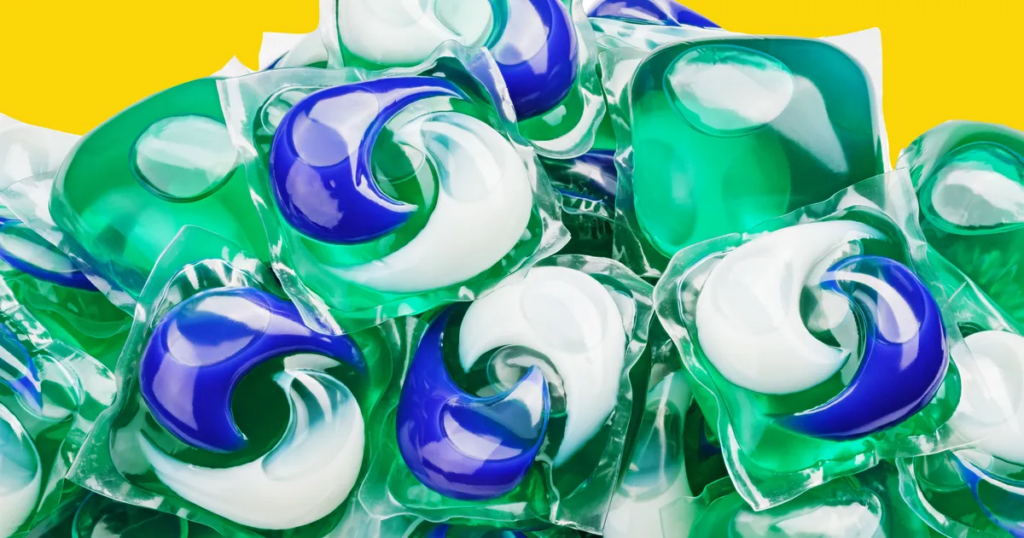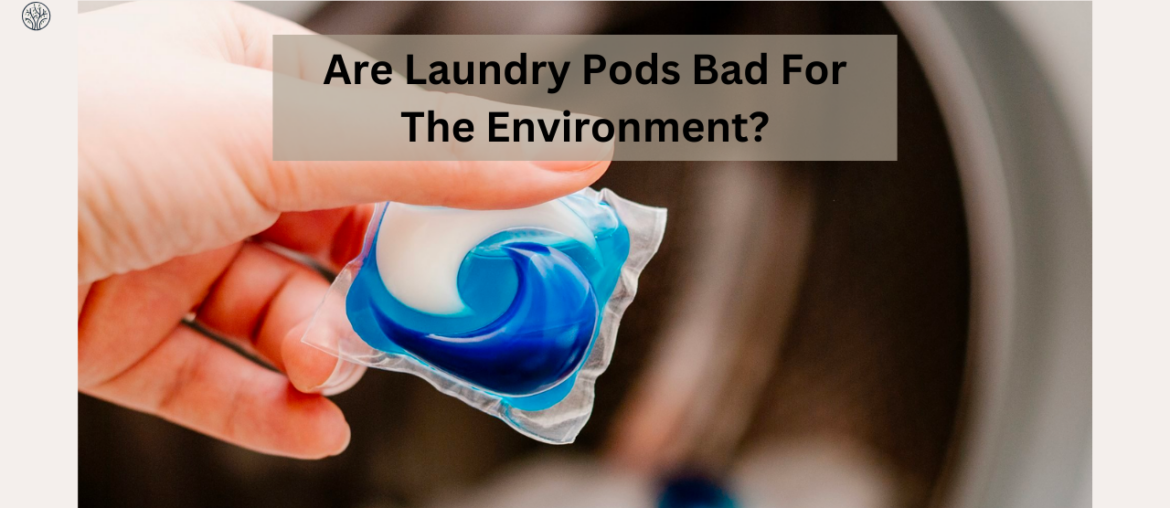Laundry pods, those tiny pre-measured detergent packages, are a prime example of household products designed to simplify our daily chores. But as we strive to make our lives easier, we must also consider the environmental impact of our choices. So while promising ease of use and convenience, are laundry pods bad for the environment?
In this article, we’ll explore the eco dilemma surrounding these popular laundry products.
What Are Laundry Pods?
Laundry detergent pods, sometimes called detergent pouches or liquitabs, are small, dissolvable pouches filled with concentrated laundry detergent, softener, and other laundry stuff. Procter & Gamble first brought them to the market as Tide Pods in February 2012 (called Ariel Pods in Europe).
Detergent pods are different from regular liquid or powdered detergents. They have only about 10% water, while liquids contain 50% or more water. This high concentration of active ingredients is a major advantage of pods.
They’re designed to make laundry easier—no need to measure out detergent. Just toss a pod into the washing machine, saving time and ensuring accurate measurements every time.
What Are Laundry Pods Made Of?
Laundry pods are packed with strong cleaning ingredients inside a dissolvable film. They work similarly to regular liquid detergents but have less water. The outer layer of laundry pods and sheets is primarily composed of a petroleum-based plastic known as polyvinyl alcohol (PVA) or PVOH, sometimes derived from PVA. This plastic serves as the water-soluble film that encases the detergent ingredients.
The design allows the pod to dissolve in water, releasing its contents when it comes into contact with moisture, like in a washing machine.
Are Laundry Pods Bad For the Environment?

The convenience of laundry pods is undeniable – they simplify the washing process, ensuring the right amount of detergent without any mess. However, their environmental impact has been a cause for concern.
To assess this impact, we need to understand the fundamental question: are laundry pods bad for the environment?
Are Laundry Pods Plastic?
At first glance, laundry pods might not seem like a plastic product. After all, they’re filled with liquid detergent, and their outer layer is not the rigid plastic we associate with bottles and containers.
However, a closer look reveals that the outer layer of laundry detergent sheets is primarily composed of polyvinyl alcohol (PVA). Polyvinyl alcohol is a polymer, so by definition, it is plastic – a synthetic petroleum-based plastic, to be precise.
While PVA are water soluble polymers designed to dissolve in cold water when it comes into contact with it during the washing process, it doesn’t completely disappear. Instead, it breaks down into smaller plastic particles, creating a hidden plastic pollution issue that many consumers are unaware of.
This raises red flags for environmentalists and eco conscious consumers alike.
Where Does The Plastic Go?
The dissolvable nature of PVA raises a perplexing question: where does the plastic from laundry pods go? Laundry pods and sheets that utilize PVA are arguably worse than visible plastic items like straws. While a straw prompts immediate disposal action due to its tangible nature, dissolved PVA conveniently slips through our consciousness.
When we stir sugar or salt into water, they dissolve, but they do not disappear – their essence lingers. Similarly, when PVA dissolves in our washing machines, it vanishes from sight. However, this disappearance does not equate to environmental harmlessness.
The dissolved PVA, along with dirt, suds, and wastewater, flows through pipes and conduits, ending up at treatment plants. Here, it mixes with other pollutants and undergoes treatment. Despite these processes, some PVA remains, contributing to water pollution.
Are Laundry Pods Safe?
It’s important to think about safety when looking at the impact of laundry pods on the environment. Besides the environmental worries about PVA, the chemicals inside the pods also raise safety concerns.
Most common laundry pods contain lots of different ingredients and chemicals. Some of these can be bad for both your health and the environment. These ingredients can include things like phosphates, bleach, ammonium sulfate, and ammonium quaternary sanitizers. When these ingredients get washed down the drain, it can be worrying because of the harm they might do to water ecosystems.
Moreover, detergent pods have been linked to a concerning trend: rising cases of household poisonings. In a single year between 2012 and 2013, poison control centers in the USA reported over 7,000 cases of young children eating laundry pods. The appeal lies in their bright colors and heavy fragrances, making them appear deceptively like a delicious treat. This alarming trend underscores the safety risks associated with these products.
So Finally, Are Laundry Pods Eco Friendly?
Based on the evidence, when it comes to eco friendly laundry practices, most laundry pods turn out not to be as good an option as they seem. Despite what manufacturers say, most laundry pods on the market aren’t good for the environment. Many people use these pods, thinking they’re helping, but they’re actually causing pollution without realizing it.
The American Cleaning Institute (ACI) says 60% of PVA film breaks down in 28 days, and it all degrades in 90 days. But, it’s more complicated than that.
The process of fully biodegrading PVA is far from straightforward. It needs certain microorganisms in the right amount, trained to break it down. But, wastewater plants, where these pods end up, don’t have the right conditions. The water doesn’t stay with the microbes long enough (no more than 28 days), so claims of biodegradation don’t really work.
In addition to the plastic inside laundry pods, their eco-friendly image is also harmed by the excessive packaging. Most pods are individually wrapped in plastic, which worsens the plastic waste issue. This excessive use of packaging not only pollutes the environment but also contradicts the eco-friendly claims of manufacturers.
Summing Up
Are laundry pods harmful to the environment? Yes, they are. The problem with laundry pods is urgent and important. Despite claiming to be convenient and eco-friendly, they fall short. The plastic in these pods, along with slow decomposition and too much packaging, raises concerns for eco-conscious shoppers.
As responsible consumers, it is crucial to be aware of the impact our choices have on the planet. By opting for genuinely eco friendly, plastic free laundry detergents, we can pave the way for a more sustainable future—one where convenience does not come at the expense of our environment.
That way, can we pave the way for a cleaner, greener planet.









